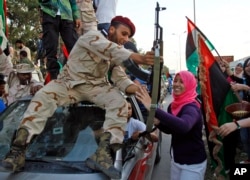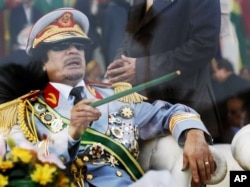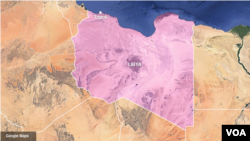Anniversaries have come and gone to mark the start of the February 2011 uprising to topple Libyan autocrat Colonel Moammar Gadhafi and to remember his gruesome death on a desert road outside the coastal city of Sirte months later. Hope has slowly given way to sobering experience and the north African country is no closer to resolving a multi-sided conflict dividing regions, towns and militias.
On Thursday, Libyans will start marking the seventh anniversary of a revolution that still hasn’t met their expectations and the consequences of which are still fracturing a country ensnared in dispute and violence.
WATCH: On Seventh Anniversary of Libyan Uprising, Peace Remains a Dream
“For some Libyans, this year’s anniversary will be more bitter than sweet,” says Mary Fitzgerald, a researcher specializing in the country who witnessed the anti-regime protests in Benghazi in late February 2011 that quickly spread to the rest of the country.
“Seven years on Libya’s divisions run deep as a result of post-Gadhafi power struggles that tipped into years of armed conflict in 2014 and still paralyze the country today. Tellingly, elements associated with the former regime are more confident now than at any time since Gadhafi’s ousting.
"Others dream of military rule. Caught in between are ordinary Libyans struggling to make ends meet who feel the promise of their revolution has been betrayed. A growing number of Libyan youth are taking the smugglers’ boats to Europe,” she adds.
Six and a half years ago this VOA correspondent reported from Libya on the first and second anniversaries of the February 15 protests and the February 17 uprising. Back then Libyans quelled their doubts about the future. Gadhafi’s ouster was fresh and the freedom to say what they liked was still novel, the most obvious fruit of the uprising. Confidence remained amid the crackle of fireworks, blaring patriotic music and militiamen letting off bursts of automatic gunfire. People never tired of predicting that Libya one day would become a “Dubai on the Mediterranean.”
In Tripoli’s Martyrs’ Square the young especially were ebullient celebrating those early anniversaries. I remember a bright-eyed 22-year-old student, Nabila, who was celebrating with her friends, telling me, "today means everything for Libyans, especially for me. I am so happy for this day. Because everybody is going around with flags celebrating the revolution, this is the freedom for Libya.”
But away from the scenes of mainly youthful revelry with young men and women seizing rare opportunities to mingle casually and unsupervised, many Libyans were worried about rising lawlessness, a surge in drug use and crime, the machinations of warlords and militia chiefs and the remaining resentment of Gadhafi supporters.
The early governments appeared ham-fisted and all too often incompetent — ministries existed only in name having been hollowed out and ignored by Gadhafi. A series of prime ministers came and went, with unrealistic plans remaining unfulfilled. As one lawmaker complained to me in 2014: “All these foreigners arrive with different model constitutions we should adopt and they have grand ideas about governance, but they forget we are a conservative nation lacking in basic expertise and we need someone to explain the mechanics and how simply to get from A to B.”
And each successive year since Gadhafi’s ouster the transition from autocracy to democracy has proven a far more arduous road than the original revolutionaries — and their NATO backers —foresaw with the emergence of jihadists, the arrival of an Islamic State affiliate, a split between the east and west of the country and rivalry between competing governments, at one time three of them. Powerful human trafficking gangs have emerged, linked to various militias.
Looming over the chaos is the polarizing figure of General Khalifa Haftar, a renegade general who heads the ‘Libyan National Army’ and has made little secret of his ambition to become Libya's next strongman. He has only recently offered conciliatory statements about a UN-sponsored push to hold nationwide elections this year. He has frequently claimed in the past that Libya is not ready for democracy and Western powers are warning him now not to sabotage an election process that has already seen the assassinations of a string of self-declared electoral candidates.
Five United Nations envoys have tried to oversee a deal between warring factions but to little avail. Emadeddin Muntasser, a Libyan human rights activist and political analyst, fears the latest U.N. plan backed by Western powers will crash and that nationwide elections scheduled for later this year are unworkable.
“The 2011 Libyan revolution promised to bring freedom and democracy to a region that endured a brutal dictatorship for almost half a century, “ he argues in a policy paper published Tuesday on the web-site of the Atlantic Council, a New York-based think tank. “With tribes, Islamists, anti-Islamists, extremists, and pro-Gadhafi oligarchy all competing for power and claiming legitimacy, Libya is now at a critical crossroads,” he says.
“With elections only a few months away, the U.N. has not addressed the lack of security or the lack of basic freedoms in areas controlled by various warlords,” he adds. He says the best way forward would be for incremental elections to be held with towns signing up as they see fit and sending representatives to a new parliament that slowly emerges and starts in an evolutionary way to stabilize the country.
Michel Cousins, a co-owner of the English-language newspaper Libya Herald, and who stepped down as its editor last month, also believes that the only way forward is a de facto political evolution. He told readers that he has “little confidence in the current political process in Libya.” But he added that he remains upbeat: “Yet, despite the stalemate and despite the fact that Libya has been listed by Forbes Magazine as the second worst country in the world to do business, there is light at the end of the tunnel.”
There are islands of functionality in the country, he argues. “There are opportunities, in particular at the local level where life continues as normal. There is a small handful of exceptions to this, but go to Misrata, to Zintan, to Tobruk, Beida, Gharyan, Khoms, Zuwara and so many other towns and cities, and they are functioning relatively normally. Libya is effectively now a decentralized state where local municipalities have learned that if anything is to happen they are the ones who have to do it.”
But that approach also remains uncertain. The risks are high for the islands of stability being sucked into spiraling conflict. Awash with guns and bombs, the violence continues. Even Haftar, who declared last July that his forces had succeeded in their goal of bringing stability to the eastern city of Benghazi and clearing it of jihadists, has little control of events on his patch. On January 23 a double car bombing ripped through Benghazi killing at least 33 people. The first blast was outside a mosque frequented by Haftar’s own fighters.
Amid the wrecked hopes there is a major irony. There is more speculation nowadays that Gadhafi’s second son, Saif al-Islam, may one day stage a political comeback, and some ordinary Libyans are pinning their hope on him emerging as the country’s leader. Freed last June after six years as a prisoner of a militia in the town of Zintan, he has been maneuvering behind-the-scenes. He could have saved his country a lot of pain, if he had split from his father seven years ago on the eve of the uprising, which some friends say he did seriously consider. If he had, it would have likely brought his father down without any fighting.









